"Habemos papam!" - Leo XIV
Friday, May 9, 2025
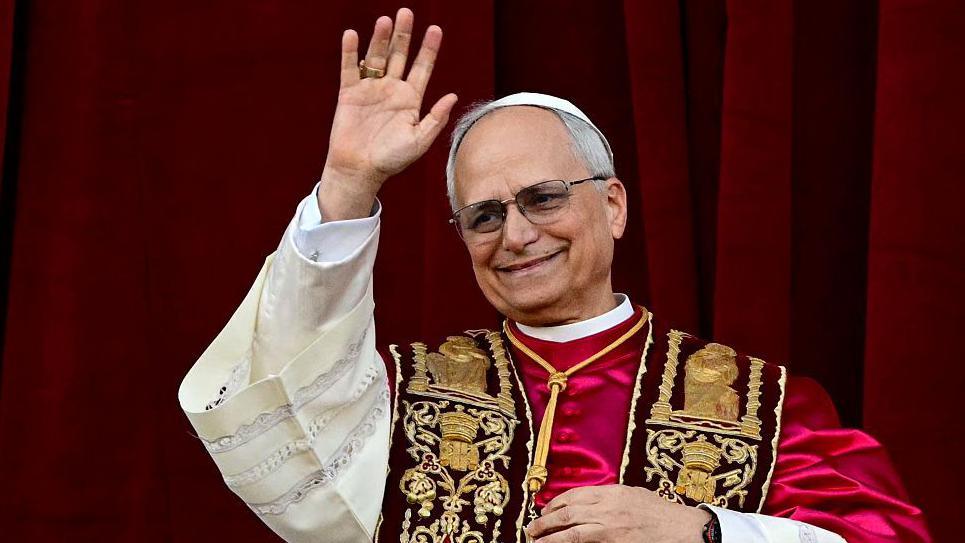 White smoke puffed out of the chimney stack of the Sistine Chapel in Vatican City at 18.10 yesterday, Thursday May 8 to inform the waiting world that a new pope had been chosen. White smoke puffed out of the chimney stack of the Sistine Chapel in Vatican City at 18.10 yesterday, Thursday May 8 to inform the waiting world that a new pope had been chosen.
Photo of Pope Leo XIV [Photo courtesy of Getty Images]
After four votes the 133 cardinals from all over the world had made their decision. The new pope was to be Robert Prevost from Chicago, the first ever pope from the USA. He had chosen the name Leo. He will be Pope Leo XIV.
Background
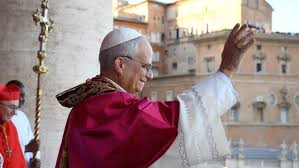 Leo XIV is young, just 69. He was born in Chicago (Illinois) to immigrant parents, a Franco-Italian father and a mother with Spanish roots. Leo XIV is young, just 69. He was born in Chicago (Illinois) to immigrant parents, a Franco-Italian father and a mother with Spanish roots.
He served as an altar boy and was ordained as a priest in 1982.
He then moved to Peru in South America three years later aged 30 to be a missionary.
Pope Leo XIV waves to the crowd in St Peter's Square [Vatican News]
He stayed in Peru for many years gaining Peruvian nationality, and becoming Archbishop of his church.
What did he have to say to the faithful waiting in St Peter's Square, Vatican City, Rome?
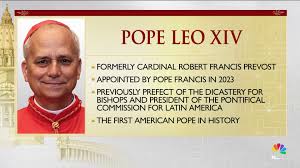 In his first speech as pope, Pope Leo XIV stepped onto a balcony in front of a crowd of 40,000 people in St Peter's Square in the Vatican and brought a "greeting of peace", and encouraged people to "Help us, and help each other, build bridges," as well as paying tribute to Pope Francis. In his first speech as pope, Pope Leo XIV stepped onto a balcony in front of a crowd of 40,000 people in St Peter's Square in the Vatican and brought a "greeting of peace", and encouraged people to "Help us, and help each other, build bridges," as well as paying tribute to Pope Francis.
[Image courtesy of NBC News]
Leo XIV spoke in Italian, but he delivered part of his address in Spanish as a nod to Peru.
"Hello to all and especially to those of my diocese of Chiclayo in Peru, a loyal, faithful people accompanying the bishop and helping the bishop," he said.
Press and media:
In pictures: A new pope is chosen - CNN
León XIV: ¿por qué Robert Francis Prevost ha elegido ese nombre para ser Papa y cuántos más ha habido en toda la historia del Vaticano? - AS.com
Pope Leo XIV live: New American pontiff Robert Prevost to hold first Mass amid claims he’s ‘anti-Trump’ - MSN / The Independent
Pope Leo XIV: Who is the new Pope? - BBC Newsround
Robert Prevost elected as first American pope and takes the name Leo XIV | CNN
© Paul Whitelock
Pictures:
Getty Images, NBC News, Vatican News
With thanks to:
AS, BBC, CBBC, CNN, MSN, NBC News, The Independent, Vatican News, Wikipedia
Tags:
133 cardinals, 40,000 people, 69, altar boy, archbishop, AS, BBC, Chicago, Chiclayo, CBBC, CNN, first ever pope from the USA, Franco-Italian father, Getty Images, "greeting of peace", Illinois, immigrant parents, Italian, Leo XIV, MSN, mother with Spanish roots, NBC News, ordained as a priest, Peru, Peruvian nationality, Pope Francis, Pope Leo XIV, Robert Prevost, Rome, St Peter's Square, Sistine Chapel, Spanish, The Independent, Thursday May 8, Vatican, Vatican City, Vatican News, white smoke, Wikipedia
 0
Like
Published at 11:10 AM Comments (0)
0
Like
Published at 11:10 AM Comments (0)
Victory in Europe Day
Thursday, May 8, 2025
Victory in Europe Day
 Victory in Europe Day is the day celebrating the formal acceptance by the World War II Allies of Germany's unconditional surrender of its armed forces on Tuesday, 8 May 1945; it marked the official surrender of all German military operations. Victory in Europe Day is the day celebrating the formal acceptance by the World War II Allies of Germany's unconditional surrender of its armed forces on Tuesday, 8 May 1945; it marked the official surrender of all German military operations.
King George VI, Queen Elizabeth, Princess Elizabeth (l) & Princess Margaret (r), Buckingham Palace, May 8, 1945 [Associated Press]
Commemorations 80 years on
Several countries observe public holidays on the day each year, also called Victory Over Fascism Day, Liberation Day, or Victory Day. In the UK, it is often abbreviated to VE Day, a term which existed as early as September 1944, in anticipation of victory.
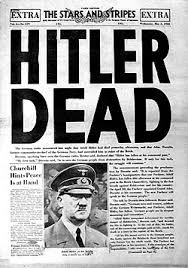 Adolf Hitler, the Nazi leader, had committed suicide on 30 April during the Battle of Berlin, and Germany's surrender was authorised by his successor, Reichspräsident Karl Dönitz. Adolf Hitler, the Nazi leader, had committed suicide on 30 April during the Battle of Berlin, and Germany's surrender was authorised by his successor, Reichspräsident Karl Dönitz.
The administration headed by Dönitz was known as the Flensburg Government.
The act of military surrender was first signed at 02:41 on 7 May in SHAEF HQ at Reims, and a slightly modified document, considered the definitive German Instrument of Surrender, was signed on 8 May 1945 in Karlshorst, Berlin at 22:43 local time.
[Wikipedia]
Celebrations in 1945
Upon the defeat of Germany, celebrations erupted throughout the Western world, especially in the United Kingdom, in North America and in Russia.
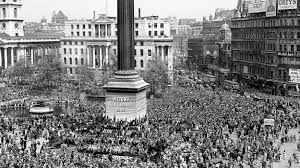 More than one million people celebrated in the streets throughout the UK to mark the end of the European part of the war. In London, crowds massed in Trafalgar Square and up the Mall to Buckingham Palace, where King George VI and Queen Elizabeth, accompanied by their daughters and Prime Minister Winston Churchill, appeared on the balcony of the palace before the cheering crowds. Churchill went from the palace to Whitehall, where he addressed another large crowd. More than one million people celebrated in the streets throughout the UK to mark the end of the European part of the war. In London, crowds massed in Trafalgar Square and up the Mall to Buckingham Palace, where King George VI and Queen Elizabeth, accompanied by their daughters and Prime Minister Winston Churchill, appeared on the balcony of the palace before the cheering crowds. Churchill went from the palace to Whitehall, where he addressed another large crowd.
VE Day celebrations in Trafalgar Square, London [BBC]
Press coverage:
80 years ago World War II in Europe was over. Celebrating V-E Day is now tinged with some dread - MSN/AP News
BBC to mark 80th Anniversary of VE Day
Churches across England to mark 80th Anniversary of VE Day with commemorations, bell ringing, and prayers for peace | The Church of England
VE-Day: How it unfolded, told through CBC's original reports | CBC News
Europe marks 80 years since VE day as Continent faces new security realities – The Irish Times
The warning of VE Day - New Statesman
VE Day 2025: A moment of joy captured 80 years ago | UK News | Sky News
VE Day 2025 celebrations: King and Royal family watch Red Arrows flypast - The Telegraph
VE-Day: How it unfolded, told through CBC's original reports | CBC News
In the German press and media:
Die letzten Kriegstage 1945 - Bundesarchiv
Die "Stunde null" – das Kriegsende 1945 in Bildern | STERN.de
Kriegsende 1945: Die letzten Tage des Dritten Reichs - Politik - SZ.de
Kriegsende 1945: So endete der Zweite Weltkrieg im Norden | NDR.de - Geschichte - Chronologie - Kriegsende
Kriegsende 1945: Wieso die Wehrmacht zweimal kapitulierte - ZDFheute
Kriegsende vor 80 Jahren: Als Frankfurt zur Frontstadt wurde - Frankfurter Allgemeine Zeitung
© Paul Whitelock
Photos:
Associated Press, BBC, Wikipedia
Acknowledgements:
AP, BBC, Bundesarchiv, Church of England, CBC, CBS, FAZ, Irish Times, MSN, New Statesman, NDR, Stern, SKY News, Suddeutsche Zeitung, Telegraph, ZDF
Tags:
Allies, AP, BBC, Bundesarchiv, Churchill, Church of England, CBC, CBS, Dönitz, Flensburg Government, FAZ, George VI, Germany, Hitler, Irish Times, Karl Dönitz, Karlshorst, MSN, Nazi leader, New Statesman, NDR, North America, Queen Elizabeth, Princess Elizabeth, Princess Margaret, Reims, Russia, Stern, SKY News, Suddeutsche Zeitung, Telegraph, Trafalgar Square, United Kingdom, VE Day, VE Day celebrations, Wikipedia, World War II, ZDF
 0
Like
Published at 10:21 AM Comments (1)
0
Like
Published at 10:21 AM Comments (1)
El Apagón - the Big Shutdown
Wednesday, May 7, 2025
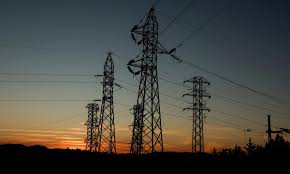 Around mid-day last Monday most of Spain, Portugal and parts of France suffered a major power-cut, named by the Spanish Press as El gran apagón. Around mid-day last Monday most of Spain, Portugal and parts of France suffered a major power-cut, named by the Spanish Press as El gran apagón.
It took some eight hours for power to be restored to some areas; other areas had to wait until Tuesday for the power to come back on.
It was a strange, yet amusing situation, albeit critical too.
From a personal perspective
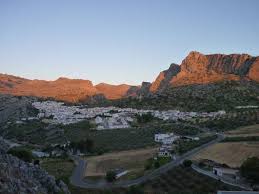 I was in a small village in the Serranía de Ronda at the time. Montejaque (pop: 960). I'd just gone to the square after a hard day working on my house in the village. I was in a small village in the Serranía de Ronda at the time. Montejaque (pop: 960). I'd just gone to the square after a hard day working on my house in the village.
The Plaza de la Constitución is home to three bars. They were all open. Two promptly closed because without electricity they couldn't prepare hot food nor keep drinks cold. So, with little money to be made, they called it a day. What happened to the concept of "service"?
The one remaining bar, La Melli, stayed open. They had no food, but they did have loads of ice cubes.
Montejaque blackout [Photo: iStock]
I was sitting with a group of other guiris: Anya, a Dutch resident; two Dutch tourists; three French women who had just arrived; and another Briton, Barry, who owns a house in Montejaque, but lives in Japan with his Japanese wife, Mika. There were just two Spaniards.
What had happened?
We didn't know, to begin with, as it was difficult to access news. No TV; no radio; no WiFi; mobile phone systems down.
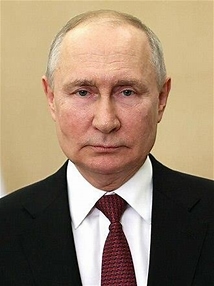 Added to that, with no electricity we couldn't pay by credit card; nor could we draw cash from the "cajero" at the bank. Added to that, with no electricity we couldn't pay by credit card; nor could we draw cash from the "cajero" at the bank.
There were no lights in the shops, so you couldn't see what you were buying; the fridges and freezers stopped working, and so did the tills. At the checkout everything had to be written down and added up with pen and paper and a calculator or in the head. And you needed the right money in cash.
Back to our mobile phones, if you had "roaming" you could access some information. Somebody got onto a reputable Press website which told us the France, Germany, Morocco, Portugal and Spain were affected.
People began to joke that it was probably a cyber attack by Vladimir Putin in Russia. But, maybe it really was!?
By Tuesday we knew that the countries affected were Spain, Portugal and parts of France. Apparently, their national grids are linked in some way.
Putin [Wikipedia]
One Week Later
A week further on and nobody seems to be any the wiser. Investigations are still ongoing.
Typically this has caused a political row in Spain with Alberto Núñez Feijóo (PP), the leader of the opposition, taking advantage to blame the government, led by Pedro Sánchez (PSOE).
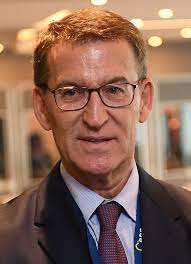 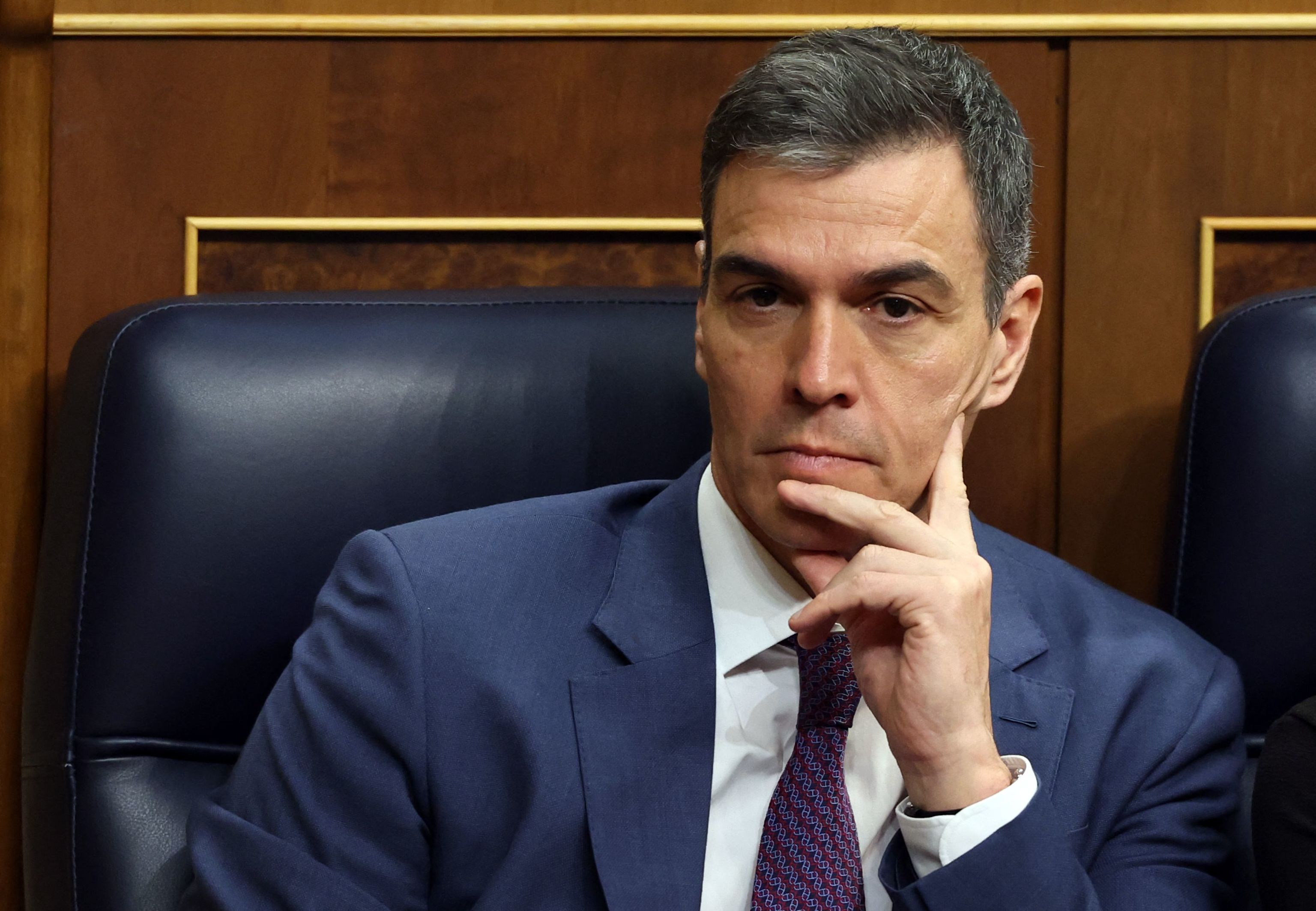
Feijóo [Facebook] Sánchez [Wikipedia]
It is quite clear that the government is NOT to blame. As in many countries, electricity was privatised some years ago.
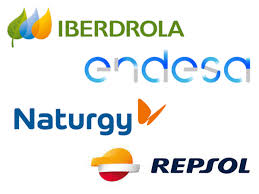 These private companies, eg Endesa, Iberdrola, Naturgy and Repsol are more interested in paying their shareholders a dividend than investing in improvements to the electricity infrastructure. These private companies, eg Endesa, Iberdrola, Naturgy and Repsol are more interested in paying their shareholders a dividend than investing in improvements to the electricity infrastructure.
It has become clear that the Spanish system is not fit for purpose.
The sooner the government takes essential services like electricity, gas and water back under its control, the better, in my opinion.
[El Periódico de la Energía]
How did the apagón affect us personally?
We had no light, no heating and no water - we have a pozo (well), so our underground spring needs electricity to pump it into our deposito. We had no telly, no radio and no internet.
"We need to buy a generator!" says the missus, Rita. "In case it happens again!"
We'll see …..
Links:
What is a guiri? It's what the Spanish call us foreigners - but is it good or bad?
© Paul Whitelock
Photos:
El Periódico de la Energía, Facebook, Huff Post, iStock, Wikipedia
Acknowledgements:
Facebook, Wikipedia
Tags:
Alberto Núñez Feijóo, Anya, Barry, blame the government, "cajero", cyber attack, deposito, Dutch resident, Dutch tourists, El gran apagón, El Periódico de la Energía, Endesa, Facebook, France, freezers, French women, fridges, generator, Huff Post, Iberdrola, iStock, Japanese wife, La Melli, loads of ice cubes, major power-cut, Mika, mobile phones, mobile phone systems, Montejaque, Naturgy, no electricity, no heating, no internet, no light, no lights in the shops, no radio, no TV, no telly, no water, no WiFi, PP, PSOE, Pedro Sánchez, Plaza de la Constitución, political row in Spain, Portugal, pozo, Repsol, Rita, "roaming", Serranía de Ronda, "service", Spain, Spanish Press, tills, Vladimir Putin, Wikipedia,
áéíóú
 0
Like
Published at 5:09 AM Comments (3)
0
Like
Published at 5:09 AM Comments (3)
Spam post or Abuse? Please let us know
|
|